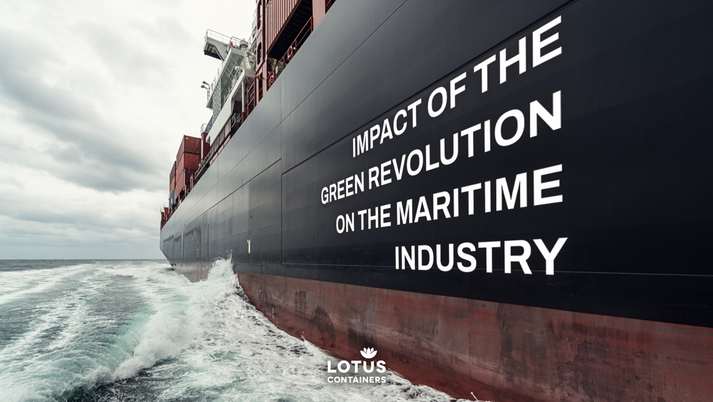The impact of the green revolution has encouraged the maritime industry to adopt environmentally friendly ways of shipping. Global shipping accounts for massive GHG emissions and other pollutants that destroy maritime flora and fauna. To counter this, the International Maritime Organisation has devised to implement regulatory practices that channelise the maritime industry towards sustainable shipping. Companies are investing immensely to adhere to IMO guidelines and achieve zero-emission shipping by 2050. The blog is an overview of the impact of the green revolution.
What is green shipping?
Digitalisation trends in freight forwarding is an emerging and effective way of managing international shipping. The shipping industry is being impacted by economic hazards that need to be countered. Green shipping is the act of commercial shipping of cargo containers or people across the ocean by utilising the lowest number of resources and energy. The shipping business transports cargo and passengers internationally, contributing to the expansion of the global network. Over the years, cargo shipping advanced due to revolutions in the shipping industry, which led to many environmental hazards generated by pollutants. To counter this, green shipping was introduced by the International Maritime Organisation. Green shipping provides an environmentally friendly way of carrying out oversea trade. The maritime sector is now switching to renewable fuels to sustain energy and contains greenhouse gas(GHGs) emissions from shipping.
Impact of shipping on the environment
The massive shipping operations of the maritime sector have an impact on marine life.
- Polluted air – The sea vessels used for commercial shipping burn the fuels for energy and emit harmful gases as by-products. GHGs like sulphur dioxide, sulphur and nitrous oxides are released into the air, making it toxic for the environment. The CO2 emissions severely threaten marine ecosystems by making the water warmer, affecting corals, and disrupting ocean circulation, causing storms.
- Shipping discharges – The quality of the sea’s water is decreased by discharges from maritime vessels primarily used for passenger transport. Water discarded from shipping coolants and wastewater from kitchens, washrooms, and laundries is poured into the ocean which harms marine life.
- Oil spills – Any shipping accident can have a persistent and deadly impact on marine life. Oil spills form a layer on the surface of the water, contaminating it and inhibiting the sun’s rays from penetrating ocean depths. It impacts marine life as mammals lose their feathers, animals die, and the pollutant harms many aquatic species.
Strategies to reduce shipping emissions
The impact of the green revolution on the maritime industry has led to the adoption of newer resources to control pollution. IMO devised a set of guidelines to reduce carbon emissions and modulate energy efficiency in the shipping industry.
- Biofuels – The shipping industry is switching to biodiesel as they are cleaner, renewable and biodegradable. Biofuels have low sulphur levels and record low levels of carbon emissions. Therefore, it is accepted as a sustainable means of reducing GHGs significantly.
- Wind energy – Favourable weather and proper wind direction can make shipping cheaper and environment-friendly. The maritime sector can conserve significant resources and reduce carbon emissions by harnessing wind power for sailing.
- Green hydrogen – It can eliminate carbon emissions during transit. Although a costly and space-consuming resource, it is an effective way of reducing GHGs.
- EEXI and CII – The EEXI and CII regulations are tools devised by IMO to control and contain GHGs. It helps to track the shipping emission rate and helps lower and control emissions.
- Slow Steaming – A significant downfall in GHG emissions was noted by reducing sea vessels’ speed. Although it makes shipping more time-consuming, it is environmentally friendly.
What is the Impact of the Green Revolution on the shipping industry?
The drive towards environment-friendly shipping has tipped the linking of newer concepts and technology for optimum shipping. With the vision of reducing carbon emissions to zero per cent by 2050, the International Maritime Organisation has strictly laid out new concepts and ensured their implementation.
- Step up with green financing – The IMO’s foundations regarding GHG emissions have led the maritime industry to invest its capital into sea vessels. Companies are modernising and enhancing existing ships and purchasing more efficient and technology-friendly vessels to reduce carbon footprints. Therefore, financial institutions have initiated ‘green funds’ using ‘green bonds’ to provide financial aid with the aim of promoting sustainable shipping.
- Step up with the green shipping corridor – An initiative of the International Maritime Organisation, green shipping corridors are maritime routes between two or more major ports, built with the aim of decarbonisation. It facilitates sustainable shipping as it conserves the natural habitat by offering zero-emission shipping, and utilising renewable resources of energy during voyages. Lower or zero rates of pollution help in preserving the marine ecosystem, thereby making these green corridors an optimum solution for sustainable shipping. It is a modern means of allowing logistics and transportation to flourish without hampering marine ecosystems.
- Step up with green technologies – Digitalisation in the maritime industry is an effective way that encourages green revolution. Companies have begun to use technological solutions to optimise navigation routes for shipping. loT solutions are ideal as they can be attached to ships and satellites to provide real-time navigation. It helps avoid traffic routes and provides the easiest route for energy-efficient shipping.
Commercial industries are focused on building an environmentally friendly framework to minimise the effects of modernisation on the ecosystem. The impact of the green revolution in the maritime sector is immense and will improve global conditions in the upcoming years.
LOTUS Containers is a leading global marketer of affordable shipping containers. With a robust shipping network with around 300+ container depots, we adhere to the SOLAS convention to provide sustainable shipping container solutions.




